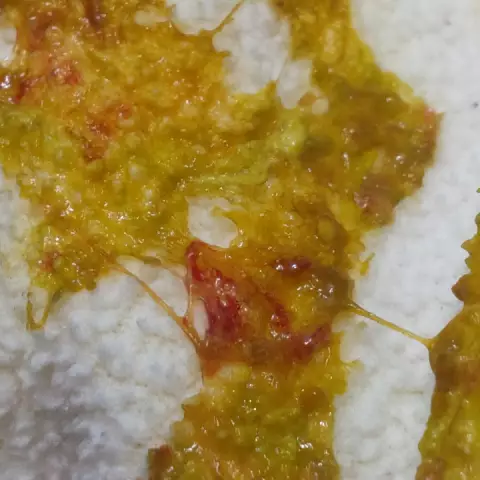- Author Curtis Blomfield [email protected].
- Public 2024-01-07 17:35.
- Last modified 2025-01-23 17:01.
Blood in the feces in children is a pathology that may indicate problems in the digestive system. If such signs are found in their baby, parents should urgently take him to the doctor.
Blood in feces in children: causes

The most common factors leading to the appearance of this pathology include:
- The presence of constipation or hemorrhoids in the baby, which can cause the appearance of microcracks in the mucous membrane of the anus. That is why when the stool passes through it, the latter turn reddish or have small streaks of blood.
- Infectious diseases of the intestine that cause damage to its mucous membrane. These can be salmonellosis, amoebiasis, giardiasis, rotovirus infection, dysentery, etc. Along with the appearance of blood, the baby may have a sharp rise in temperature, pain in the abdomen, vomiting and diarrhea with mucus impurities.
- Intestinal diseases of a congenital nature. For example: Meckel's diverticulum, Hirschsprung's disease, etc.
- Blood in a baby's stool may indicate a lactase deficiency.
- Foreign body in the intestine or injury.
- In newborns, blood in the stool occurs when the baby swallows blood during childbirth.
- Intestinal microbial contamination.
- Ulcerative colitis, Crohn's disease or other chronic diseases.
- Intestinal volvulus. Signs of this condition may be the child's refusal to eat, constant crying, sudden restlessness.
- Gastritis.
- Blood in the stool in children can appear when there are polyps in the intestines or stomach.

How to recognize which part of the intestine is bleeding?
In the case when there is blood throughout the mass of the child's feces, it can be assumed that the source of its release is located high. This can be judged by its dark color. If only minor blood stains are present, then most likely the bleeding occurred in the lower intestine. The presence of normal red streaks indicates hemorrhoidal bleeding. If the blood in the stool in children has a scarlet color, then it should be assumed that there has been a violation of the development of the internal organs that are responsible for the digestion process. In babies fed on mother's milk, this pathology may be the result of an irritable bowel reaction.
First steps

As soon as parents see streaks of blood in a child's stool, their first action is to call a doctor. In this case, you should not put the baby on his stomach, and even more so stroke him on it. It is necessary to give the child warm water to drink and, under no pretext, give him anything to eat, at least until the doctor arrives. Also, do not resort to cold compresses, which can only aggravate the situation and cause inflammation. And most importantly - you should not resort to self-medication, since some causes of blood in the stool in a child require urgent surgical intervention. And timely diagnosis will help not to miss the beginning of the development of a serious disease.






